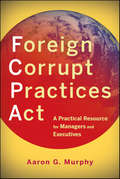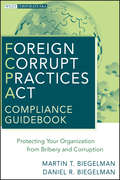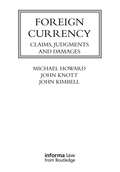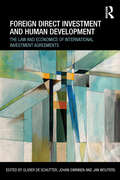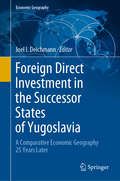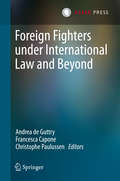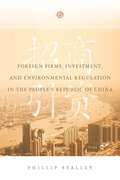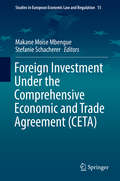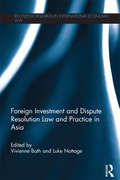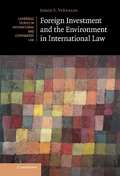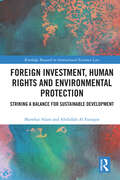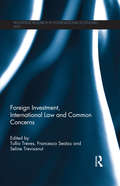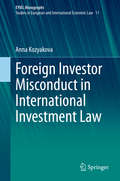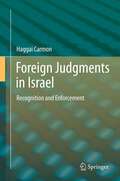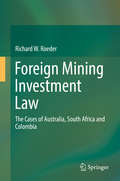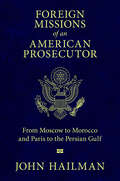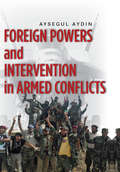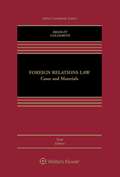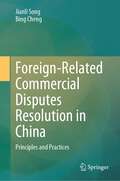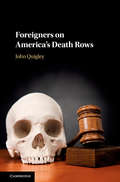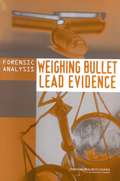- Table View
- List View
Foreign Corrupt Practices Act
by Aaron G. MurphyA thoroughly pragmatic guide to the U. S. Foreign Corrupt Practices Act (FCPA) This is a critical FCPA training resource for executives, managers, sales, marketing, finance and accounting personnel, as well as high level professionals. The ideal resource for any business that takes FCPA compliance seriously and truly desires to foster a deep understanding of real-world corruption issues in their employees A great resource for business school courses on international business or business ethics and anyone interested in understanding these issues for their own professional growth Includes in-depth analysis of all major FCPA risk areas, including discussions of how FCPA issues arise in real-world business situations Covers all aspects of bribery and FCPA compliance issues to ensure that your business is not exposing itself to financial scandal or criminal prosecution FCPA compliance is mandatory for nearly all international businesses operating in today's global economy. This book serves as the perfect training tool to mitigate your organization's risk to FCPA violations, which is one of the top enforcement priorities for the Department of Justice (DOJ) and the Securities and Exchange Commission (SEC).
Foreign Corrupt Practices Act Compliance Guidebook
by Daniel R. Biegelman Martin T.Foreign Corrupt Practices Act Compliance Guidebook shows readers how the Foreign Corrupt Practices Act (FCPA) has grown to critical importance to any U. S. company that does business in a global environment, as well as foreign companies that supply or have agency agreements with U. S. companies. It provides an overview of the business risks and guidance on spotting potential red flags regarding FCPA violation. Business professionals are provided with practical guidance on managing FCPA requirements as part of an overall compliance program.
Foreign Currency: Claims, Judgments and Damages (Lloyd's Commercial Law Library)
by Michael Howard John Knott John KimbellCurrency fluctuation, currency wars and even potential currency collapse (the Euro, the Bitcoin) are all risks that commercial parties must consider and guard against. This book gathers together in one volume all the information and advice practitioners are likely to need when advising on, advancing or defending claims involving a foreign currency element. The determination of the proper currency (or currencies) of a claim often has a dramatic effect on the level of a court judgment or arbitration award that is ultimately obtained. It is, therefore, vital for practitioners to accurately assess claims which involve a foreign currency element. The authors guide the reader through the legal principles governing how foreign currency claims are treated in English law. The book covers both the treatment of foreign currency in substantive law as well as such procedural matters as how to claim interest correctly on a foreign currency claim and how to plead, prove or disprove the applicability of a particular currency. This book is an invaluable and essential resource for all lawyers involved in international commerce, but will be of particular interest to those engaged in international finance, commodity transactions, international shipping and transport, and the insurance of assets and liabilities abroad. "Those who practise in this country need guidance in navigating the tricky waters that The Despina R unleashed. This excellent book provides that guidance." The authors "have been uniquely well placed to meet the challenge of analysing what is a perplexing body of jurisprudence, and to suggest principled answers to currency issues that have not yet been the subject of judicial decision. They consider not merely claims in contract and tort, but every type of claim that might raise an issue in relation to a foreign currency." The Rt Hon. The Lord Phillips of Worth Matravers, KG, PC, President of the Supreme Court of the United Kingdom, 2009-2012
Foreign Direct Investment and Human Development: The Law and Economics of International Investment Agreements (Routledge Research in International Economic Law)
by Johan Swinnen Olivier De Schutter Jan WoutersThis book presents original research that examines the growth of international investment agreements as a means to attract foreign direct investment (FDI) and considers how this affects the ability of capital-importing countries to pursue their development goals. The hope of countries signing such treaties is that foreign capital will accelerate transfers of technologies, create employment, and benefit the local economy through various types of linkages. But do international investment agreements in fact succeed in attracting foreign direct investment? And if so, are the sovereignty costs involved worth paying? In particular, are these costs such that they risk undermining the very purpose of attracting investors, which is to promote human development in the host country? This book uses both economic and legal analysis to answer these questions that have become central to discussions on the impact of economic globalization on human rights and human development. It explains the dangers of developing countries being tempted to 'signal' their willingness to attract investors by providing far-reaching protections to investors' rights that would annul, or at least seriously diminish, the benefits they have a right to expect from the arrival of FDI. It examines a variety of tools that could be used, by capital-exporting countries and by capital-importing countries alike, to ensure that FDI works for development, and that international investment agreements contribute to that end. This uniquely interdisciplinary study, located at the intersection of development economics, international investment law, and international human rights is written in an accessible language, and should attract the attention of anyone who cares about the role of private investment in supporting the efforts of poor countries to climb up the development ladder.
Foreign Direct Investment in the Successor States of Yugoslavia: A Comparative Economic Geography 25 Years Later (Economic Geography)
by Joel I. DeichmannThis edited volume offers a descriptive analysis of foreign direct investment (FDI) flows and cumulative stock, industrial composition, and important spatial trends for each successor state of former Yugoslavia: Bosnia & Herzegovina, Croatia, Kosovo, Montenegro, North Macedonia, Serbia, and Slovenia. The chapters are written by academic experts on the topic from each of these countries and are organised systematically in order to facilitate comparison between the states. The aim of this book is to advance scholarly knowledge about FDI in Southeastern Europe 25 years after the dissolution of Yugoslavia. Each chapter includes a summary of scholarly contributions published on the topic in English-language and local language journals, a discussion of origins, composition by industry, and location choice within the country from 1995-2018, using Dunning's (1980) eclectic paradigm as a discussion framework. The chapters conclude with prospects for FDI over the next twenty-five years with emphasis on economic growth projections, EU integration, and other relevant country-specific considerations the local authors deem relevant. Special attention is given to specific companies operating in Yugoslavia prior to its breakup and how these firms have been impacted by dissolution, recession, efforts toward European Union membership. The authors also examine the past and potential impact of FDI from unforeseen events such as the Global Financial Crisis and COVID-19. This book appeals to scholars of geography, international business, economics, and economic history of the former Yugoslavia as well as professionals working in the region and on related topics elsewhere.
Foreign Fighters under International Law and Beyond
by Christophe Paulussen Andrea De Guttry Francesca CaponeThis book offers various perspectives, with an international legal focus, on an important and underexplored topic, which has recently gained momentum: the issue of foreign fighters. It provides an overview of challenges, pays considerable attention to the status of foreign fighters, and addresses numerous approaches, both at the supranational and national level, on how to tackle this problem. Outstanding experts in the field - lawyers, historians and political scientists - contributed to the present volume, providing the reader with a multitude of views concerning this multifaceted phenomenon. Particular attention is paid to its implications in light of the armed conflicts currently taking place in Syria and Iraq. Andrea de Guttry is a Full Professor of International Law at the Scuola Superiore Sant'Anna, Pisa, Italy. Francesca Capone is a Research Fellow in Public International Law at the Scuola Superiore Sant'Anna. Christophe Paulussen is a Senior Researcher at the T. M. C. Asser Instituut in The Hague, the Netherlands, and a Research Fellow at the International Centre for Counter-Terrorism - The Hague.
Foreign Firms, Investment, and Environmental Regulation in the People's Republic of China
by Phillip StalleyThis new book takes as its focus a simple yet critical question: Does foreign direct investment lead to weakened environmental regulation, thereby turning developing countries into "pollution havens"? The debate over this question has never before been the focus of a book about China. Phillip Stalley examines the development of Chinese law governing the environmental impact of foreign investors, describes how regional competition for investment has influenced environmental regulation, and analyzes the environmental practices of foreign and Chinese companies. He finds only modest evidence that integration with the global economy has transformed China into a pollution haven. Indeed, after China opened its domestic market, the entry of foreign films largely strengthened the environmental protection regime, including the oversight of foreign firms' environmental practices. Nevertheless, foreign firms (and the competition to lure them) have posed new challenges to controlling industrial pollution. Stalley identifies the conditions under which foreign investment contributes to and undermines environmental protection, offering readers a solid understanding of China's environmental challenges. He also builds on existing theory and provides hypotheses that can be tested with other developing nations.
Foreign Investment Under the Comprehensive Economic and Trade Agreement (Studies in European Economic Law and Regulation #15)
by Makane Moïse Mbengue Stefanie SchachererThis book analyzes the investment chapter of a new type of trade agreement between Canada and the European Union to help readers gain a better understanding of this mega-regional deal, which includes foreign investment protection. It first provides background information on the Comprehensive Economic and Trade Agreement (CETA), particularly focusing on the chapter on foreign investment, including the rules on the entry of investments, their protection and the stringent dispute settlement mechanism. It goes on to explore whether these provisions are a further step toward reforming the current international investment law regime. It also examines the highly innovative part of the agreement: the inclusion of crosscutting issues, such as sustainable development. In addition, it examines the CETA investment chapter from the perspective of non-contracting parties, including Africa, Asia and Latin America. The book is of interest to academics and students in the field of international investment law. It is also an essential resource for government legal advisers, policymakers, business practitioners, and others dealing with international investment law.
Foreign Investment and Dispute Resolution Law and Practice in Asia (Routledge Research in International Economic Law)
by Vivienne Bath Luke NottageThis book considers foreign investment flows in major Asian economies. It critically assesses the patterns and issues involved in the substantive law and policy environment which impact on investment flows, as well as the related dispute resolution law and practice. The book combines insights from international law and comparative study and is attentive to the socio-economic contexts and competing theories of the role of law in Asia. Contributions come from both academics with considerable practical expertise and legal practitioners with strong academic backgrounds. The chapters analyze the law and practice of investment treaties and FDI regimes in Asia looking specifically at developments in Japan, India, China, Indonesia, Malaysia, Korea and Vietnam. The book explores the impact of the Asian Financial Crisis in the late 1990s and the Global Financial Crisis a decade later, examining actual trends and policy debates relating to FDI and capital flows in Asia before and after those upheavals. Foreign Investment and Dispute Resolution: Law and Practice in Asia is a valuable resource for practitioners, academics and students of International and Comparative Law, Business and Finance Law, Business, Finance and Asian Studies.
Foreign Investment and the Environment in International Law
by Jorge E. ViñualesConflicts between foreign investment law and environmental law are becoming increasingly frequent. On the one hand, the rise of environmental regulation poses significant challenges to foreign investors in several industries. On the other, the surge in investment arbitration proceedings is making States aware of the important litigation risks that may result from the adoption of environmental regulation. This study of the relationship between these two areas of law adopts both a policy and a practical perspective. It identifies the major challenges facing States, foreign investors and their legal advisers as a result of the potential friction between investment law and environmental law and provides a detailed analysis of all the major legal issues on the basis of a comprehensive study of the jurisprudence from investment tribunals, human rights courts and bodies, the ICJ, the WTO, the ITLOS, the CJEU and other adjudication mechanisms.
Foreign Investment, Human Rights and Environmental Protection: Striking a Balance for Sustainable Development (Routledge Research in International Economic Law)
by Shawkat Alam Abdullah Al FaruqueThis book examines the integration of human rights and environmental standards within international investment agreements (IIAs). It explores the intricate relationship between foreign direct investment and sustainable development, emphasizing the necessity for reform in investment treaties to ensure they support rather than hinder human rights and environmental protection.The book begins with an overview of the current international investment law landscape, focusing on its primary goal of investment protection. It then delves into how human rights and environmental standards can shape IIAs, suggesting a new approach to these treaties. The authors explore the incorporation of sustainable development principles into IIAs, the difficulty of balancing investor protection with state regulatory autonomy, and the evolving norms and standards in this area. The book includes detailed case studies on topics such as the interplay between labour standards, investment, and human rights, bilateral investment agreements, sustainable forest management, and the liberalization of water services.Aimed at policymakers, legal scholars, and international law practitioners, this book provides a thorough framework for understanding and reforming IIAs. It offers groundbreaking insights into aligning investment treaties with global sustainable development goals, making it a vital resource for anyone interested in the intersection of investment, human rights, and environmental sustainability.
Foreign Investment, International Law and Common Concerns (Routledge Research in International Economic Law)
by Francesco Seatzu Seline Trevisanut Tullio TrevesIncreasingly, transnational corporations, developed countries and private actors are broadening the boundaries of their investments into new territories, in search of a higher return on capital. This growth in direct foreign investment involves serious concerns for both the investor and host state. Various exponents of international civil society and non-governmental organisations persuasively claim that such growth in foreign investments constitutes potential and serious hazards both to the environment and the fundamental rights and freedoms of local populations. This book explores from an international law perspective the complex relationship between foreign investments and common concerns, i.e. values that do not coincide, or do not necessarily coincide, with the interests of the investor and of the host state. It pays particular attention to the role of the main international development banks in reconciling the needs of foreign investors with the protection of common concerns, such as the environment, human rights and labour rights. Among its collection of essays, the volume asks how much "regulatory space" investment law leaves; whether international investment law is an effective means of balancing contrasting interests, and whether investment arbitration currently constitutes a mechanism of global governance. In collecting the outlooks of various experts in human rights, environmental and international economic law, this book breaks new ground in exploring how attention to its legal aspects may help in navigating the relationship between foreign investment and common concerns. In doing so, the book provides valuable insights into the substantive issues and institutional aspects of international investment law.
Foreign Investor Misconduct in International Investment Law (European Yearbook of International Economic Law #11)
by Anna KozyakovaThis book examines the issue of foreign investor misconduct in modern international investment law, focusing on the approach that international investment law as it currently operates has developed towards foreign investor misconduct. The term ‘misconduct’ is not a legal notion, but is used to describe a certain phenomenon, namely, a group/class of actions. This term is convenient since it makes it possible to introduce and describe the phenomenon as such, without a division into concrete types of conduct, like ‘abuse of process’, ‘violation of national law’, ‘corruption’, ‘investment contrary to international norms and standards’, etc. The term ‘misconduct’ is intended to embrace various kinds of conduct on the part of foreign investors that the system of international investment law does not accept – such as that which it regards as illegal, against public policy, or otherwise inappropriate – and triggers legal consequences. Rarely, however, does international investment law clearly articulate what it considers unacceptable investor conduct, and certainly not in any systematic fashion. As such, this book addresses the following questions: What types of investors’ conduct are legally unacceptable? What mechanisms are available to deal with unacceptable investors’ conduct, and what are the legal consequences?
Foreign Judgments in Israel
by Haggai CarmonA judgment in a civil matter rendered in a foreign country is not automatically recognized in Israel. Before a judgment will be recognized or enforced, it must first undergo a domestic integration process. A declaration that a foreign judgment is enforceable in Israel is dependent upon its meeting certain conditions specified by statute, irrespective of whether recognition of the foreign judgment is indirect or direct. These conditions serve as the main route for giving validity to foreign in rem judgments and to personal status judgments, which cannot otherwise be enforced; recognition of a judgment as enforceable, however, enables it to be executed. The book integrates lucid, theoretical analysis of the issues of enforcement and recognition of foreign judgments with practical instructions. It thus serves as a valuable guide for anyone seeking answers to the questions examined in the book, whether in the context of international commerce or to resolve transnational legal disputes. Despite the complexity of the questions addressed in the book, they are given accurate and easily understandable answers. Haggai Carmon's book grapples with the range of issues arising from the recognition of foreign judgments and their enforcement, i.e., the declaration that they are enforceable judgments. The book thoroughly and methodically examines these issues...Haggai Carmon has outstanding expertise in international law. He has a breadth of legal knowledge and extensive experience in both the theoretical and practical aspects of both private and public international law. He serves as legal counsel to commercial entities as well as foreign governmental agencies; amongst others, he is an outside legal counsel to the government of the United States. As this text reflects, Haggai Carmon is also a first-rate scholar and he shares his knowledge in a style that is suitable to every reader. -Eliezer Rivlin, Deputy Chief Justice, the Israel Supreme Court
Foreign Mining Investment Law
by Richard W. RoederThis work analyzes and compares the legal framework for foreign investments in the mining sector in Australia, South Africa and Colombia. The admission of foreign investments, corporate structure requirements, ownership of minerals and mineral rights, mining licenses, land access, performance requirements, distribution of profits and the tax regime, repatriation of profits, national and international dispute resolution mechanisms and the question of the Social License to Operate (SLO) / Corporate Social Responsibility (CSR) policies are discussed in detail. The work concludes with an outlook on the future regulation of foreign mining investments and finally suggests the development of an International Mining Investment Law.
Foreign Missions of an American Prosecutor: From Moscow to Morocco and Paris to the Persian Gulf
by John HailmanIn his fifth book, John Hailman recounts the adventures and misadventures he experienced during a lifetime of international travel. From Oman to Indonesia, from sandstorms and food poisoning to gangsters and at least one jealous husband, Hailman explores the cultures and court systems of faraway countries. The international story begins in Paris as a young Hailman, a student at La Sorbonne, experiences the romance and excitement one expects from the City of Lights. Years later Hailman returns to France, to Interpol Headquarters in Lyon where he received his international law certificate from the National School for Magistrates. Traveling the world as a representative for the US Justice Department, Hailman encountered criminals and conspiracies, including a plot in Ossetia, Georgia, to hijack his helicopter and kidnap him. From his time as a prosecutor are tales of three very different Islamic cultures in the colorful societies and legal systems of Tunisia, Algeria, and Morocco. Hailman also travels to the chaotic world of the former Soviet Union where, at the time of his visit, a new world of old countries was trying to rediscover independent pasts. He explores the tiny country of Moldova and the beautiful and picturesque Republic of Georgia, and visits Russia during the brief period democracy was flowering and the nation was experimenting with a new jury trial system. Viewing his adventures through the lens of laws and customs, Hailman is able to give unique insight to the countries he visits. With each new adventure in Foreign Missions of an American Prosecutor, John Hailman shares his passion for travel and his fascination with other cultures.
Foreign Powers and Intervention in Armed Conflicts
by Aysegul AydinIntervention in armed conflicts is full of riddles that await attention from scholars and policymakers. This book argues that rethinking intervention-redefining what it is and why foreign powers take an interest in others' conflicts-is of critical importance to understanding how conflicts evolve over time with the entry and exit of external actors. It does this by building a new model of intervention that crosses the traditional boundaries between economics, international relations theory, and security studies, and places the economic interests and domestic political institutions of external states at the center of intervention decisions. Combining quantitative and qualitative evidence from both historical and contemporary conflicts, including interventions in both interstate conflicts and civil wars, it presents an in-depth discussion of a range of interventions-diplomatic, economic, and military-in a variety of international contexts, creating a comprehensive model for future research on the topic.
Foreign Relations Law
by Campbell MclachlanWhat legal principles govern the external exercise of the public power of states within common law legal systems? Foreign Relations Law tackles three fundamental issues: the distribution of the foreign relations power between the organs of government; the impact of the foreign relations power on individual rights; and the treatment of the foreign state within the municipal legal system. Focusing on the four Anglo-Commonwealth states (the United Kingdom, Australia, Canada and New Zealand), McLachlan examines the interaction between public international law and national law and demonstrates that the prime function of foreign relations law is not to exclude foreign affairs from legal regulation, but to allocate jurisdiction and determine applicable law in cases involving the external exercise of the public power of states: between the organs of the state; amongst the national legal systems of different states; and between the national and the international legal systems.
Foreign Relations Law: Cases and Materials (Aspen Casebook)
by Jack Goldsmith Curtis BradleyA leading casebook on foreign relations law, authored by two widely cited and experienced scholars, Foreign Relations Law: Cases and Materials, Sixth Edition examines the law that regulates the conduct of contemporary U.S. foreign relations. It offers a compelling mix of cases, statutes, and executive branch materials, as well as extensive notes and questions and discussion of relevant historical background.
Foreign in a Domestic Sense: Puerto Rico, American Expansion, and the Constitution
by Christina Duffy Burnett Burke MarshallIn this groundbreaking study of American imperialism, leading legal scholars address the problem of the U. S. territories. Foreign in a Domestic Sense will redefine the boundaries of constitutional scholarship. More than four million U. S. citizens currently live in five "unincorporated" U. S. territories. The inhabitants of these vestiges of an American empire are denied full representation in Congress and cannot vote in presidential elections. Focusing on Puerto Rico, the largest and most populous of the territories, Foreign in a Domestic Sense sheds much-needed light on the United States' unfinished colonial experiment and its legacy of racially rooted imperialism, while insisting on the centrality of these "marginal" regions in any serious treatment of American constitutional history. For one hundred years, Puerto Ricans have struggled to define their place in a nation that neither wants them nor wants to let them go. They are caught in a debate too politicized to yield meaningful answers. Meanwhile, doubts concerning the constitutionality of keeping colonies have languished on the margins of mainstream scholarship, overlooked by scholars outside the island and ignored by the nation at large. This book does more than simply fill a glaring omission in the study of race, cultural identity, and the Constitution; it also makes a crucial contribution to the study of American federalism, serves as a foundation for substantive debate on Puerto Rico's status, and meets an urgent need for dialogue on territorial status between the mainlandd and the territories. Contributors. Jos Julin lvarez Gonzlez, Roberto Aponte Toro, Christina Duffy Burnett, Jos A. Cabranes, Sanford Levinson, Burke Marshall, Gerald L. Neuman, Angel R. Oquendo, Juan Perea, Efrn Rivera Ramos, Rogers M. Smith, E. Robert Statham Jr. , Brook Thomas, Richard Thornburgh, Juan R. Torruella, Jos Tras Monge, Mark Tushnet, Mark Weiner
Foreign-Related Arbitration in China
by Fan YangThis overview and analysis of current arbitration law and practice in mainland China offers critical analysis of significant Chinese arbitration law materials and key cases decided by the Supreme People's Court of the People's Republic of China (PRC). It also provides the full texts of around two hundred decisions of the Supreme People's Court of the PRC dating from 1990 to 2013, with enclosures of lower People's Courts' decisions presented in a systematic fashion. The analysis not only highlights the importance of the materials, judicial interpretations and key cases, but also enables readers to read mainland Chinese statutes, judiciary interpretations and cases independently and confidently.
Foreign-Related Commercial Disputes Resolution in China: Principles and Practices
by Jianli Song Bing ChengCombining the author's many years of legal practice experience, this book examines the current hot and difficult issues arising in the legal practice of foreign-related commercial disputes in China. The book focuses on the application of the United Nations Convention on Contracts for the International Sale of Goods (“CISG”) in Chinese courts, judicial review of foreign-related arbitral awards, judicial cooperation in cross-border insolvency, and legal relationships in legal disputes over electronic commerce. The book pays close attention to the latest legislative achievements of the international community and their impact on Chinese judicial practice, thus helping to strengthen exchanges and cooperation among countries along the “Belt and Road” and providing more effective rule of law protection for Chinese enterprises “going global”.
Foreigners on America’s Death Rows: The Legal Combat Over Access To A Consul
by John QuigleyCapital cases involving foreigners as defendants are a serious source of contention between the United States and foreign governments. By treaty, foreigner defendants must be informed upon arrest that they may contact a consul of their home country for assistance, yet police and judges in the United States are lax in complying. <P><P>Foreigners on America's Death Row investigates the arbitrary way United States police departments, courts, and the Department of State implement well-established rights of foreigners arrested in the US. Foreign governments have taken the United States into international courts, which have ruled that the US must enforce the treaty. The United States has ignored these rulings. As a result, foreigners continue to be executed after a legal process that their home governments justifiably find to be flawed. When one country ignores the treaty rights of another as well as the decisions of international courts, the established order of international relations is threatened. Illustrates how the US government has given courts implausible arguments in order to allow state governments to execute foreigners in circumstances that violate the human rights of those foreigners and treaty obligations owed to foreign governments.<P> Helps readers to understand why foreign governments are angry when their nationals are executed in the United States.<P> Explains how the United States have become a pariah in the international community for failing to follow treaty rules that other countries follow.
Forensic Analysis Weighing Bullet Lead Evidence
by National Research Council of the National AcademiesSince the 1960s, testimony by representatives of the Federal Bureau of Investigation in thousands of criminal cases has relied on evidence from Compositional Analysis of Bullet Lead (CABL), a forensic technique that compares the elemental composition of bullets found at a crime scene to the elemental composition of bullets found in a suspect’s possession. Different from ballistics techniques that compare striations on the barrel of a gun to those on a recovered bullet, CABL is used when no gun is recovered or when bullets are too small or mangled to observe striations. Forensic Analysis: Weighing Bullet Lead Evidence assesses the scientific validity of CABL, finding that the FBI should use a different statistical analysis for the technique and that, given variations in bullet manufacturing processes, expert witnesses should make clear the very limited conclusions that CABL results can support. The report also recommends that the FBI take additional measures to ensure the validity of CABL results, which include improving documentation, publishing details, and improving on training and oversight.
Forensic Analysis of Biological Evidence: A Laboratory Guide for Serological and DNA Typing
by J. Thomas McClintockA powerful tool in the identification of individuals, DNA typing has revolutionized criminal and paternity investigations. Widespread analysis is now conducted by public and private laboratories in the United States and abroad. Focusing on the basic techniques used in forensic DNA laboratories, Forensic Analysis of Biological Evidence: A Laboratory
